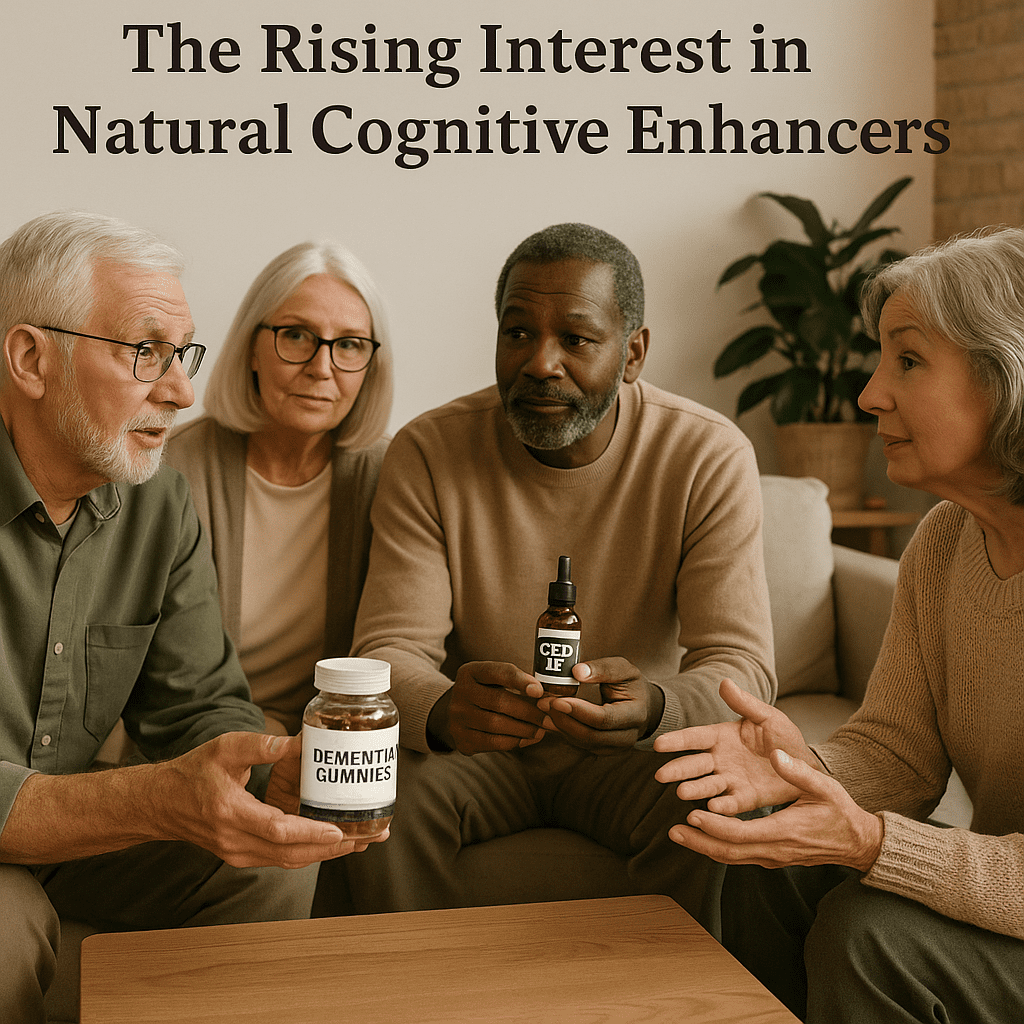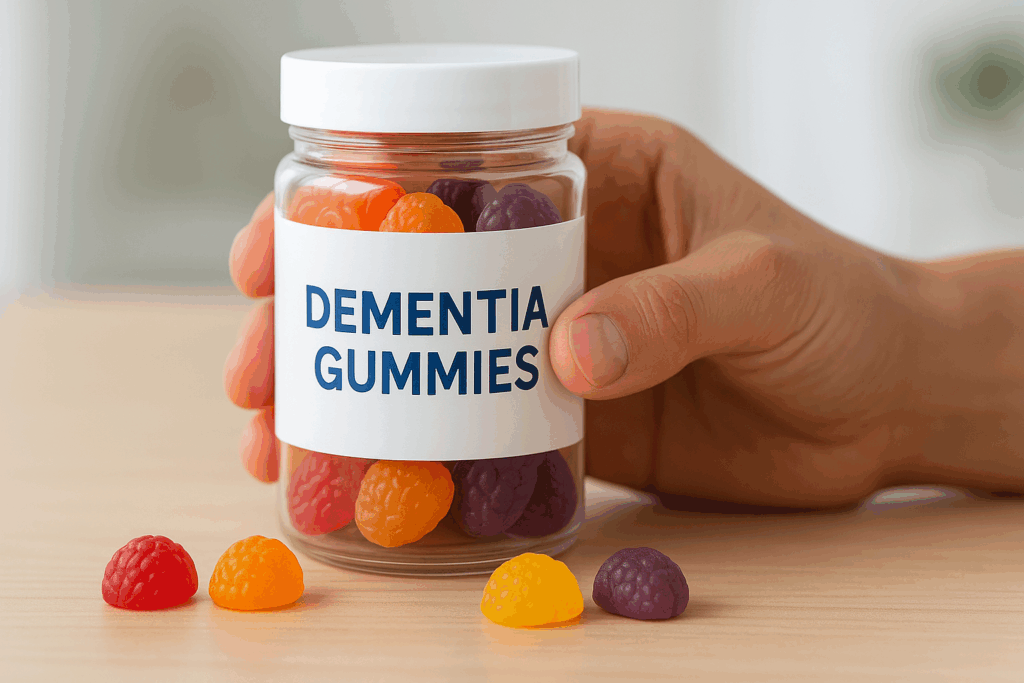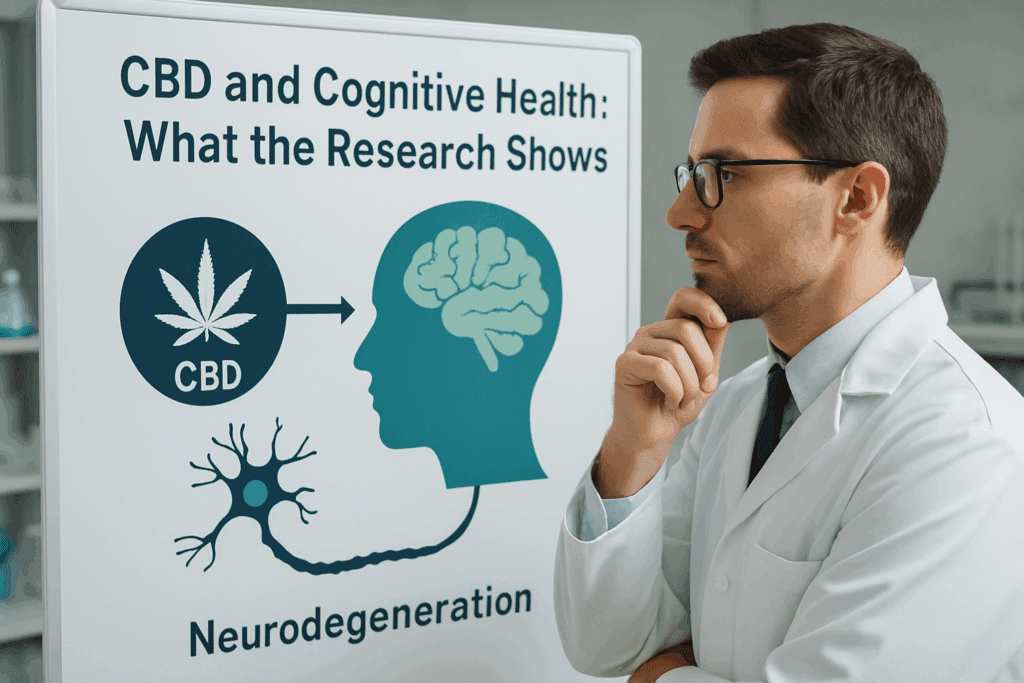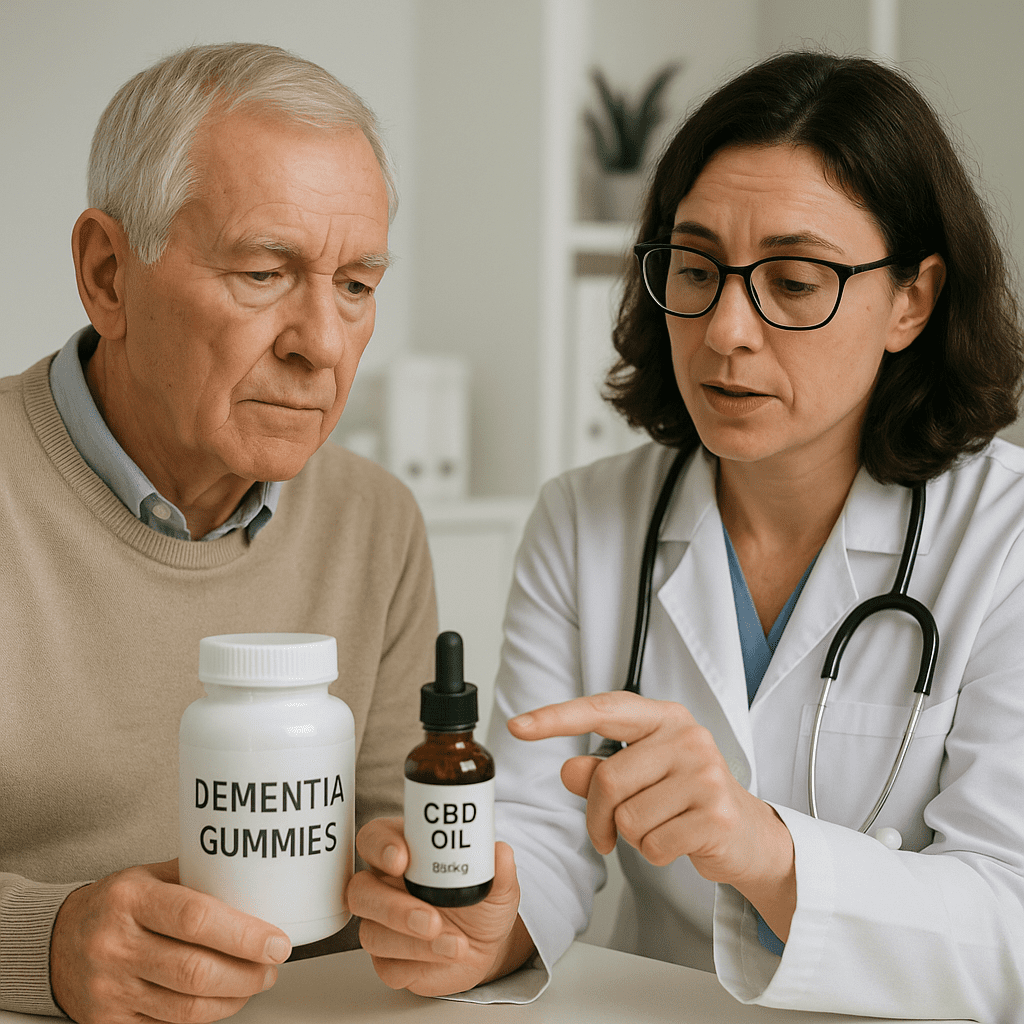In recent years, the pursuit of cognitive health has gained significant traction as more individuals seek holistic methods to support memory, mental clarity, and mood regulation, especially as they age. Among the most talked-about options in the natural health world are so-called dementia gummies—a broad term often referring to chewable supplements formulated with ingredients believed to enhance brain function—and cannabidiol (CBD), the non-psychoactive compound derived from hemp. These two approaches have surged in popularity, particularly among older adults exploring complementary strategies for cognitive decline. But can dementia gummies or CBD truly make a difference for memory and mood? And what does science actually say about their use in the context of cbd dementia care?
This article explores the evolving landscape of cognitive health supplementation through the lens of evidence-based analysis, clinical insight, and expert commentary. As we examine the therapeutic promise and practical limitations of these popular natural interventions, we’ll unpack whether their rise in popularity is justified or overhyped.
You may also like: How to Prevent Dementia and Alzheimer’s Disease Naturally: Expert-Backed Strategies to Reduce Your Risk Through Lifestyle and Diet

The Rising Interest in Natural Cognitive Enhancers
The aging global population has propelled concerns about memory loss, brain fog, and dementia-related conditions to the forefront of both medical and consumer conversations. With Alzheimer’s disease affecting over 6 million Americans and millions more worldwide, the demand for preventative and supportive measures has never been greater. People are increasingly drawn to alternative and integrative solutions, particularly those that offer the allure of neuroprotection without the side effects of pharmaceutical drugs.
Dementia gummies have emerged as a convenient and approachable method for cognitive support. Typically marketed with claims of improving memory, attention, and mood, these gummies often contain a blend of vitamins, omega-3 fatty acids, herbal extracts like Ginkgo biloba, or even nootropics. Meanwhile, CBD has gained a solid foothold in the wellness industry for its calming effects and potential neuroprotective properties. As more studies investigate the possible relationship between cbd dementia support and neural health, interest in the compound continues to rise.
While anecdotal evidence abounds, especially from older adults claiming significant improvement in mood and cognition, the scientific rigor behind these claims remains varied. Understanding the underlying mechanisms and distinguishing hype from hope is essential when considering any supplement, particularly in the nuanced context of cognitive decline.

What Are Dementia Gummies?
Dementia gummies refer to chewable supplements formulated with ingredients intended to support brain health. These products may include vitamins such as B-complex, antioxidants like vitamin E, omega-3s including DHA, herbal extracts such as bacopa or turmeric, and adaptogens like ashwagandha. Some may even include small amounts of CBD or other cannabinoids, further blurring the lines between different natural therapies.
One of the appeals of dementia gummies is their ease of use. Unlike pills or capsules, gummies are generally more palatable and easier to incorporate into a daily routine—particularly important for elderly individuals who may have difficulty swallowing traditional supplements. The flavored, chewable format also reduces the psychological barrier associated with “taking medicine,” encouraging more consistent adherence.
However, not all dementia gummies are created equal. The effectiveness of any given product depends heavily on the quality, bioavailability, and dosage of its active ingredients. Many gummies on the market may contain subtherapeutic doses or proprietary blends that obscure actual quantities. This inconsistency presents a challenge for consumers hoping to make informed decisions based on scientific evidence.
Despite their growing popularity, dementia gummies should not be mistaken for treatments for Alzheimer’s or other dementias. Rather, they may be best understood as supportive tools—part of a broader lifestyle strategy that includes diet, exercise, sleep, and mental engagement.

CBD and Cognitive Health: What the Research Shows
Cannabidiol (CBD) is one of over a hundred active compounds found in the cannabis plant. Unlike its cousin THC, CBD is non-intoxicating and has gained legal status in many countries for its therapeutic potential. Early research has linked CBD to anti-inflammatory, antioxidant, anxiolytic, and neuroprotective effects—all of which may be relevant in the context of age-related cognitive decline.
The question of cbd dementia treatment is a nuanced one. While CBD is not approved as a treatment for any form of dementia, emerging preclinical and animal studies suggest it may hold promise in managing symptoms or slowing neurodegeneration. For instance, some rodent studies have shown that CBD may reduce amyloid plaque buildup—a hallmark of Alzheimer’s disease. Other findings point to CBD’s ability to decrease neuroinflammation, modulate oxidative stress, and improve mitochondrial function, all of which are key factors in maintaining brain health.
Human trials, though limited, have provided some encouraging results. A small 2019 study published in Frontiers in Pharmacology found that CBD improved agitation in patients with advanced dementia. Other research has indicated potential benefits in anxiety reduction, sleep quality, and overall mood regulation—factors that, while not directly improving memory, can significantly enhance quality of life for individuals with cognitive impairment.
Still, experts caution against overstating the benefits. The cbd dementia connection remains under-researched, with many clinical trials in early stages. The variability in CBD dosing, delivery methods, and product quality further complicates the picture, making it difficult to draw definitive conclusions.
Mood, Memory, and the Role of Neuroinflammation
A critical aspect of both CBD and dementia gummy formulations lies in their purported impact on inflammation—specifically, neuroinflammation. Chronic inflammation in the brain has been increasingly implicated in the pathogenesis of Alzheimer’s and other neurodegenerative diseases. It disrupts synaptic communication, impairs neurogenesis, and accelerates neuronal death.
CBD’s anti-inflammatory properties have been well documented in numerous experimental models. It interacts with the endocannabinoid system (ECS), particularly the CB2 receptors found in immune cells, to modulate inflammatory cytokines. Additionally, CBD influences adenosine uptake and serotonin signaling, both of which may impact mood and cognition.
Dementia gummies, depending on their ingredients, may also play a role in inflammation control. For example, omega-3 fatty acids—commonly found in these gummies—have been shown to suppress the production of pro-inflammatory molecules and support neuronal membrane integrity. Likewise, antioxidants like vitamin E help neutralize free radicals, reducing oxidative stress that contributes to cognitive decline.
While neither intervention can be considered a standalone solution, their anti-inflammatory potential adds to the rationale for considering them as part of an integrative strategy for cognitive and emotional resilience.
The Emotional Toll of Cognitive Decline and the Promise of Mood Support
Memory loss and cognitive decline often carry a heavy emotional burden—not only for the affected individual but also for caregivers and loved ones. Depression, anxiety, agitation, and apathy are commonly associated with dementia, compounding the challenges of daily life and impairing interpersonal relationships.
CBD, in particular, has garnered attention for its mood-stabilizing properties. By interacting with serotonin 5-HT1A receptors, CBD has been shown to exert anxiolytic and antidepressant-like effects in several preclinical models. This may help explain why many individuals with early cognitive impairment report feeling calmer, more focused, or less emotionally reactive when using CBD products.
Dementia gummies, especially those containing adaptogens or calming botanicals like lemon balm and L-theanine, may also contribute to emotional well-being. Though the research in this area is less robust, some studies suggest these compounds can help regulate stress response systems such as the HPA axis, improve sleep, and enhance emotional balance.
Because mood and memory are deeply intertwined, interventions that promote emotional regulation may indirectly support cognitive function. Chronic stress and persistent negative mood states are known to impair neuroplasticity, shrink the hippocampus, and elevate cortisol levels—all factors that accelerate cognitive aging. Thus, mood support is not a trivial consideration but a central pillar in cognitive health.

Understanding Limitations and Ensuring Safe Use
Despite their potential benefits, neither dementia gummies nor CBD products are free from limitations or risks. For one, the supplement industry remains loosely regulated in many jurisdictions, which means product quality and labeling accuracy can vary widely. Independent lab testing, third-party certifications, and transparent ingredient sourcing are essential criteria for consumers to consider when evaluating these products.
CBD, though generally considered safe and well tolerated, may interact with certain medications, including blood thinners, anti-epileptics, and antidepressants. It can also affect liver enzyme activity, which could influence how other drugs are metabolized. Therefore, individuals—especially those with complex medical conditions or taking multiple medications—should consult a healthcare professional before beginning CBD supplementation.
Similarly, dementia gummies are not immune to risks. Overconsumption of certain vitamins, such as vitamin A or iron, can lead to toxicity. Additionally, some herbal extracts may have contraindications or side effects, particularly in vulnerable populations like the elderly. The seemingly harmless “gummy” format can sometimes lead to overuse, especially when products are flavored and sweetened to resemble candy.
The absence of standardized dosing protocols further complicates matters. Most available research on cbd dementia applications has used carefully measured, pharmaceutical-grade formulations, not over-the-counter products. Therefore, expectations should be tempered, and any self-directed use should begin with the lowest effective dose.
Expert Perspectives: What Clinicians and Researchers Are Saying
Experts remain cautiously optimistic about the role of CBD and targeted supplements in cognitive health, with many emphasizing the need for more rigorous, large-scale trials. According to Dr. Ethan Russo, a neurologist and cannabinoid researcher, CBD’s role in dementia care may lie more in symptom management—such as agitation and sleep disturbances—than in halting disease progression.
Dr. Dale Bredesen, an internationally recognized Alzheimer’s researcher, acknowledges the value of lifestyle and nutritional interventions in mitigating cognitive decline. While he doesn’t endorse a single “magic bullet,” he supports multi-modal strategies that include diet, stress management, and carefully selected supplements—potentially including products like dementia gummies.
Meanwhile, public health organizations urge consumers to remain skeptical of exaggerated claims. The FDA has issued warnings to companies marketing unproven CBD cures for dementia, highlighting the need for regulation and consumer protection.
These diverse perspectives underscore the complexity of the topic. While there’s hope, it’s grounded in a framework of caution, critical inquiry, and ongoing research. The question is not simply whether these products work, but how, when, and for whom they may offer meaningful benefit.
Integrating Natural Interventions into a Broader Brain Health Strategy
Dementia prevention and cognitive resilience are not achieved through isolated interventions. Instead, experts emphasize a comprehensive approach—one that includes physical activity, cognitive stimulation, a nutrient-dense diet, restorative sleep, social connection, and emotional well-being. Natural products like dementia gummies or CBD may complement this framework, but they are not substitutes for these foundational pillars.
For instance, pairing CBD with a Mediterranean-style diet rich in polyphenols, omega-3s, and leafy greens may amplify its potential benefits. Similarly, taking dementia gummies that include B-complex vitamins alongside regular mental stimulation—like learning a language, solving puzzles, or engaging in creative hobbies—may enhance neural plasticity.
Moreover, creating a supportive environment is essential. Caregivers, clinicians, and loved ones should be educated about the range of available tools, both conventional and complementary, so they can make collaborative, informed choices. Open dialogue about natural therapies—grounded in respect for personal experience and scientific integrity—will be key in shaping the future of cognitive health.
Frequently Asked Questions: Exploring Dementia Gummies and CBD for Cognitive Health
1. Can dementia gummies be used alongside prescription medications for Alzheimer’s or other forms of dementia?
While some dementia gummies are marketed as complementary cognitive support, combining them with prescription medications requires careful consideration. Certain vitamins, herbs, or cannabinoids found in these supplements may interact with cholinesterase inhibitors or memantine—two common medications prescribed for Alzheimer’s disease. For instance, ginkgo biloba, a frequent ingredient in dementia gummies, can increase bleeding risk when combined with anticoagulants. Even though the natural appeal of gummies may suggest safety, patients should always consult with a healthcare provider before introducing them alongside pharmaceutical treatments. Coordinated care ensures that potential benefits of dementia gummies are not offset by adverse interactions or diminished therapeutic outcomes.
2. How does the legal landscape of CBD affect access to products for dementia-related support?
Access to cbd dementia products varies significantly depending on regional regulations, especially between countries or even individual U.S. states. While hemp-derived CBD is federally legal in the United States under the 2018 Farm Bill, some local jurisdictions still impose restrictions on sales, labeling, or therapeutic claims. This disparity can complicate the availability of high-quality, standardized CBD intended for cognitive health. Patients and caregivers often find it challenging to identify legitimate products due to inconsistent regulation and lack of oversight in labeling. As the legal framework evolves, it’s essential to choose cbd dementia formulations from reputable brands with clear third-party lab verification to ensure safety and compliance.
3. Are there any age-related considerations when using dementia gummies for early cognitive decline?
Age can influence how the body metabolizes the ingredients in dementia gummies, making personalized use especially important. Older adults may have slower gastrointestinal absorption or reduced liver function, potentially affecting how efficiently they process active compounds like curcumin, DHA, or B-vitamins. Moreover, taste preferences and swallowing difficulties may also impact adherence, even for chewable formats. In younger individuals experiencing early-onset cognitive symptoms, dementia gummies might be used preventatively, although scientific backing is still limited for this demographic. Regardless of age, tailoring supplement choices to individual metabolic, dietary, and neurological profiles helps ensure optimal results from dementia gummies.
4. How does CBD support sleep quality in individuals with dementia, and why is this important?
Sleep disturbances are a common yet often overlooked feature of dementia, leading to agitation, sun downing behaviors, and caregiver burnout. Emerging studies suggest that CBD can help regulate circadian rhythms and promote deeper sleep by modulating the endocannabinoid system and interacting with GABAergic pathways. Better sleep not only reduces behavioral symptoms but may also play a neuroprotective role by facilitating glymphatic clearance—an essential brain process for removing neurotoxic waste. For patients exploring cbd dementia support, improvements in sleep may indirectly enhance cognitive performance, emotional regulation, and caregiver quality of life. This makes sleep-focused CBD formulations an increasingly researched area in integrative dementia care.
5. What role does caregiver education play when introducing dementia gummies into a care plan?
Caregiver awareness is pivotal when incorporating dementia gummies into any regimen, especially given the variability in product composition. Education empowers caregivers to monitor for subtle changes—positive or negative—that may result from new supplements. Understanding potential side effects, correct dosing, and synergistic interactions with diet or medications can prevent misuse and improve consistency. Furthermore, involving caregivers in decision-making helps reinforce routines, which are critical for individuals with cognitive impairment. When caregivers are well-informed about the purpose and realistic outcomes of dementia gummies, they are better equipped to advocate for their loved one’s holistic care.
6. Are there biomarkers that can help determine if CBD is working for dementia-related symptoms?
Currently, there are no universally accepted biomarkers that can definitively track the effects of CBD on dementia. However, researchers are exploring surrogate indicators such as changes in brain-derived neurotrophic factor (BDNF), inflammatory cytokines, and electroencephalographic (EEG) patterns. Improvements in sleep architecture, stress hormone levels, or neuroimaging profiles may offer indirect clues, though these are mostly experimental and not part of routine care. In practical terms, caregivers and clinicians rely on behavioral assessments, mood tracking, and daily functioning metrics to evaluate the impact of cbd dementia interventions. As the field advances, biomarker-guided personalization could become an essential tool for optimizing CBD use in cognitive care.
7. What innovations are emerging in the formulation of dementia gummies to increase their effectiveness?
Advancements in nutraceutical science are bringing new technologies to dementia gummies, such as liposomal delivery systems, Nano emulsification, and time-release coatings. These innovations aim to improve the bioavailability of key compounds like coenzyme Q10, lutein, or phosphatidylserine, which often suffer from poor absorption in traditional formats. Some companies are also integrating apoptogenic herbs alongside nootropics to enhance both cognitive and emotional resilience. Personalized formulations based on genetic testing or cognitive risk profiles are beginning to emerge, making dementia gummies more targeted than ever. As competition increases in the supplement market, innovation is driving a shift from generic blends to clinically informed, precision-focused gummy products.
8. Could long-term use of CBD slow the progression of dementia or is its role mainly symptomatic?
Current scientific evidence suggests that CBD’s primary benefit in dementia lies in symptom management rather than disease modification. However, some preclinical studies point toward mechanisms—such as reduced neuroinflammation and oxidative stress—that could theoretically slow neuronal degeneration. For instance, CBD has shown the potential to inhibit tau hyperphosphorylation and amyloid-beta aggregation in animal models, both hallmarks of Alzheimer’s pathology. Yet, without longitudinal human trials, claims that cbd dementia therapy can halt or reverse disease progression remain speculative. At this stage, the most evidence-based use of CBD is as an adjunct to support mood, reduce agitation, and promote sleep in dementia care.
9. How might cultural perceptions affect the acceptance of dementia gummies and CBD in elder communities?
Cultural attitudes toward supplements and cannabis-derived compounds can significantly influence whether older adults feel comfortable using dementia gummies or CBD. In some communities, there may be longstanding skepticism toward “nontraditional” remedies, often shaped by generational beliefs, religious practices, or previous experiences with pharmaceuticals. Conversely, younger caregivers or adult children may push for integrative approaches, creating tension within family decision-making. Language barriers, stigma surrounding cannabis, and lack of culturally relevant education can further delay adoption, even when cbd dementia interventions might be beneficial. Health campaigns that emphasize scientific validation, cultural sensitivity, and patient autonomy are critical for bridging these gaps and fostering informed choice.
10. What does the future look like for dementia care that includes gummies and CBD?
The future of cognitive care is increasingly moving toward integrative and personalized models, where dementia gummies and CBD may play supportive roles. Researchers are investigating combined interventions—such as pairing CBD with digital therapeutics, neuromodulation, or functional nutrition—to optimize outcomes. Advances in wearable technology may also enable real-time monitoring of behavior and mood changes in response to these natural interventions. As precision medicine expands, we may see cbd dementia products tailored to specific genetic or biochemical markers, enhancing both efficacy and safety. The convergence of neuroscience, technology, and botanical medicine suggests that the next decade could bring profound transformation to how we support cognitive health across the lifespan.
Final Thoughts: Can Dementia Gummies or CBD Help with Cognitive Health?
As interest grows in the intersection of natural remedies and cognitive wellness, the conversation around dementia gummies and cbd dementia applications continues to evolve. While neither option can currently claim to prevent or cure dementia, both hold promise as supportive tools within a larger integrative strategy. Their value lies not in miracle cures but in nuanced, evidence-informed support—addressing inflammation, mood, and possibly even neuroprotection.
Consumers should approach these products with both curiosity and critical thinking. Quality, transparency, and proper guidance are essential when selecting any supplement, particularly in the complex domain of brain health. With ongoing research and thoughtful use, dementia gummies and CBD may indeed play a small but meaningful role in supporting memory, mood, and overall mental clarity—especially when paired with the pillars of healthy aging.


